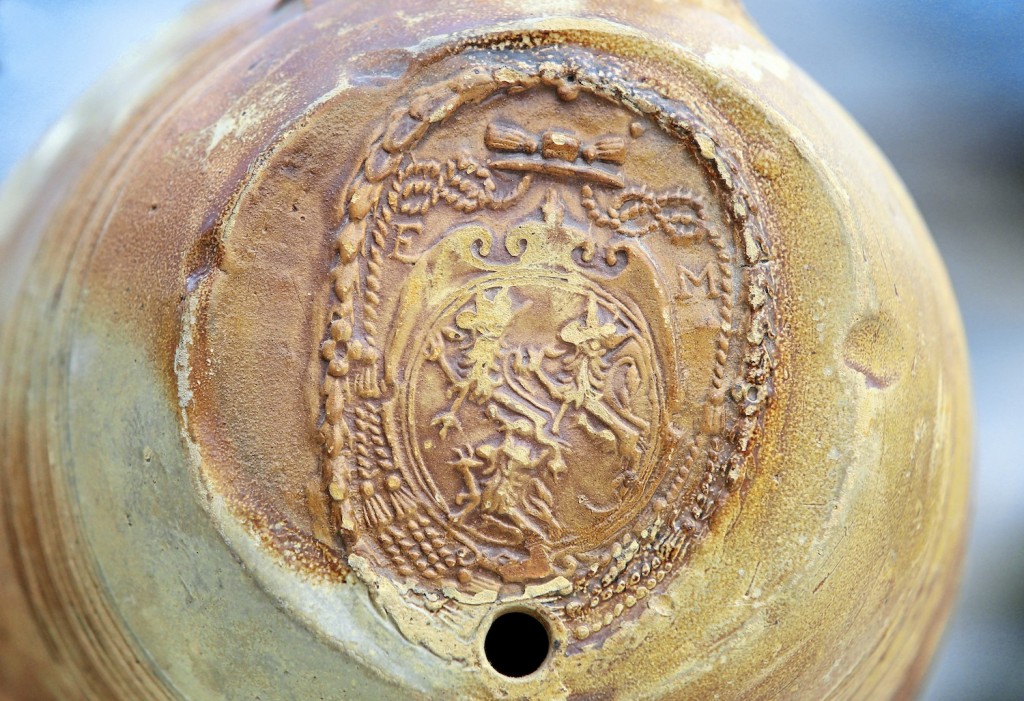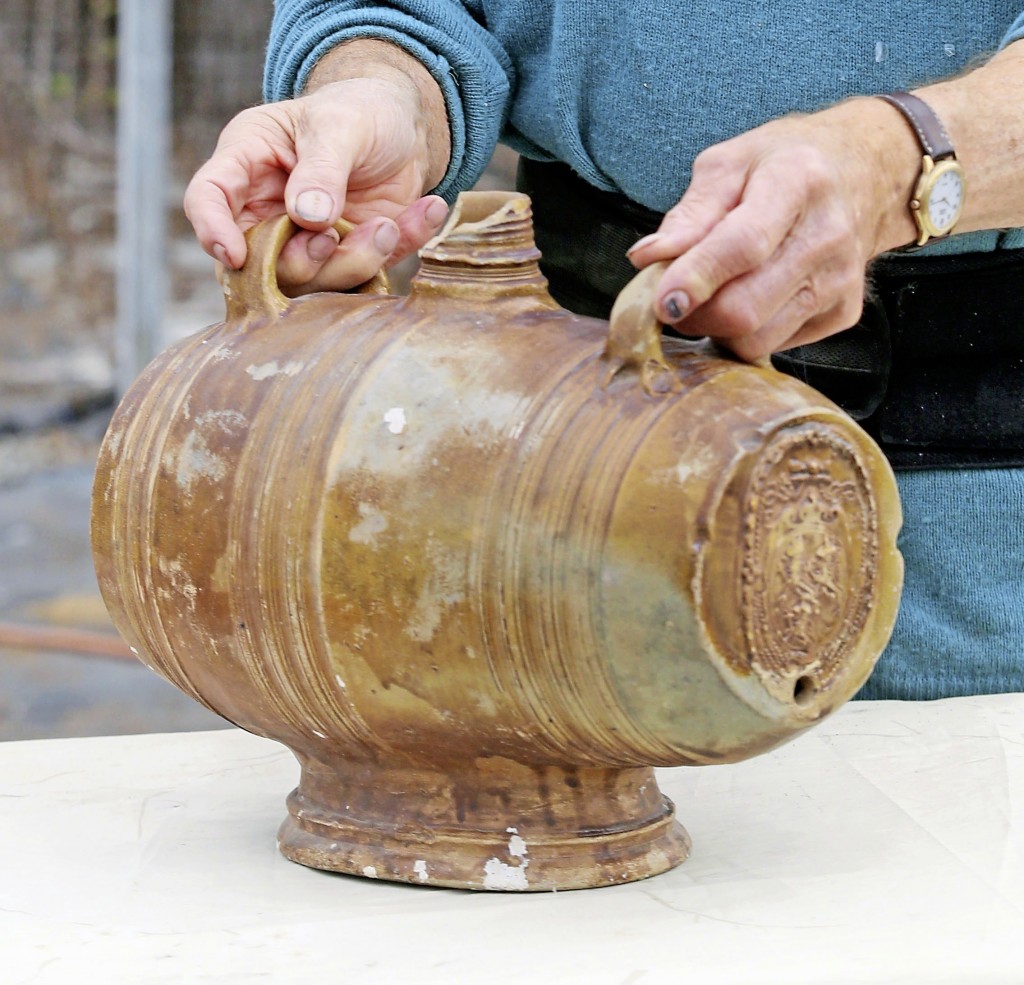News
Marine Antiquities Scheme nets 100 finds in first year

More than 100 archaeological and historical marine finds have been submitted during the first year of the Marine Antiquities Scheme. This is an initiative launched to protect and improve our knowledge of the nation’s underwater heritage by encouraging the voluntary recording of items found in English and Welsh waters
A host of unique finds have been recorded by divers, beach walkers, recreational anglers and other marine users. Archaeological and historical discoveries ranging from Neolithic flints and Roman serving wares to post-medieval candlesticks and remnants of modern ordnances have been submitted, with location information and photographs of the items.
Launched in July 2016, the Marine Antiquities Scheme (MAS) is a joint initiative, funded by The Crown Estate, modelled on The British Museum’s Portable Antiquities Scheme (PAS) and managed by Wessex Archaeology.
The scheme was established to enhance awareness of the nation’s marine heritage by helping characterise the archaeological nature of the marine environment. It also allows finders to learn more about their discoveries and gives the public access to data for research. The Crown Estate funds the MAS as part of its responsible management of the seabed and for the benefit it delivers in helping to derisk future opportunities using the seabed, such as offshore wind and other developments.
Central to MAS is a simple-to-use app that makes recording finds easy and gives finders immediate feedback, as well as instructions on their statutory obligations including the need to report wrecks to the Receiver of Wreck, an official of the Maritime and Coastguard Agency.
Following the submission of a new find, a support team of archaeological experts undertake research on each item to learn more about its origins and history. The information is then published on the MAS database, which is accessible to anyone interested in the history hidden under the waves and provides opportunities for wider research.
To date, the majority of the finds have come from Kent and Essex, reflecting the especially active diving communities in those areas.

The almost complete salt-glazed stoneware barrel costrel, almost certainly German and probably dating to the 17th century. Pic by Tom Tardif.
The Crown Estate’s senior development manager, Matthew Clear, said: “I am delighted that the MAS reached 100 finds in its first year, it is a clear sign that there is a strong appetite for the voluntary reporting of underwater discoveries. The positive uptake of the scheme by divers, fishermen, and other coastal visitors has delivered a wealth of information which supports our responsible management of the seabed, and aids us in derisking future opportunities and encouraging investment.”
Wessex Archaeology’s Toby Gane adds: “We have had some very interesting post-medieval ‘onion bottles’ dating to around 1700 and what looks like a German salt glazed stone wear jug from a similar period, along with later dated square gin bottles, and pottery finds from the 19th and 20th centuries.”
While many finds are newly discovered, the scheme also enables those with legacy finds, recovered and reported in previous years, to submit them to the MAS database.
One such find was a salt-glazed stoneware barrel costrel, almost certainly German and probably dating to the 17th century. It was originally recovered in 1966 during a dive at a depth of approximately 60 feet. It was found along with two lots of cannon, cannonballs and lead sheeting at a site near the Channel Islands.
More unusual items reported include the remnants of a ships funnel or ventilator that was to be used in an art exhibition and a symmetrical 19th century surgeon’s pestle.
The MAS app is available to download from relevant app stores for iOS and Android phones and tablets.
Finders can also submit information on-line via an electronic recording form located on the scheme’s website www.marinefinds.org.uk.
Gear News
Introducing the TR-80, IR-50 and CS-30 Regulators from DYNAMICNORD

Whether you are a beginner or a professional diver – with the three new main regulators from DYNAMICNORD, everyone will find their favourite regulator. They all look super stylish.
Excellent performance with the TR-80
Quality and performance are the be-all and end-all for regulators. It is not for nothing that the TR stands for Tec Reg. The innovative design of the TR-80 guarantees absolute reliability – even in ice-cold waters.

Perfect breathing effort at 0.8 J/l / certified for diving in waters below 10 degrees / structural design made of solid brass for best cold protection / membrane-compensated design with dry seal of the first stage / reduced exhalation effort thanks to optimized exhalation membrane and bubble deflector / adjustable Venturi (dive/predive) and adjustment knob for individual inhalation comfort / innovative design of the front cover prevents free-flow in strong currents or when diving with scooters / design made of sandblasted brass, matt chrome finish / 2 HP and 4 LP outlets / mouthpiece made of high-quality, anti-allergic silicone for maximum comfort.


Amazing underwater adventures with the IR-50
The IR-50 is the top regulator for advanced and experienced divers. Natural breathing is the essence of this regulator.

Ideal breathing effort at 0.8 J/l /certified for diving in waters below 10 degrees / compensated membrane / adjustable venturi (dive/predive) and adjustment knob for individual inhalation comfort/ outlet valve and deflector for minimum exhalation effort and reduction of bubbles on the face / design made of sandblasted brass, matt chrome finish / 2 HP and 4 NP outlets / mouthpiece made of high-quality, anti-allergic silicone for maximum comfort.


The Workhorse – our CS-30
For diving centres and diving beginners – the workhorse stands for strong construction, reliability and robustness. Perfect for your training.

Optimal breathing effort at 0.8 J/l /recommended for diving in waters above 10 degrees / non-compensated piston / adjustable venturi (dive/predive) / outlet valve and deflector for minimum exhalation effort and reduction of bubbles on the face / design made of sandblasted brass, matt chrome finish / 1 HP and 3 NP outlets / mouthpiece made of high-quality, anti-allergic silicone for maximum comfort.


Octopus OP-30
The OP-30 is the ideal addition to all DYNAMICNORD regulators. It is identical in construction to the CS-30.

The TR-80, IR-50, CS-30 (DIN & INT) regulators and the Octopus OP-30 are available from DYNAMICNORD dealers and in the online store.
DYNAMICNORD – Your Outdoor Companion.
Marine Life & Conservation
Paul Watson Released as Denmark Blocks Japan’s Extradition Bid

Renowned anti-whaling activist Paul Watson has been released from custody in Greenland after spending five months in detention. Denmark’s Justice Ministry rejected Japan’s request for his extradition, citing insufficient guarantees that his time already served in custody would be credited against any potential sentence.
The 74-year-old Canadian-American was arrested on July 21 in Nuuk, Greenland’s capital, when his ship docked to refuel. His arrest was based on a 2012 Japanese warrant related to a 2010 encounter in Antarctic waters. Japan alleged Watson obstructed operations and caused damage to a whaling research ship during efforts to disrupt illegal whaling. Watson has consistently denied these claims, maintaining his commitment to marine conservation.
Denmark, which oversees extradition matters for Greenland, concluded that while the legal conditions for extradition were met, the lack of assurances from Japan regarding time-served credit made extradition untenable.
In a video shared by his foundation, Watson expressed gratitude and relief, saying, “After five months, it’s good to be out… and good to know they’re not sending me to Japan.” He added that the most difficult part of his time in custody was being separated from his two young sons.
Watson is a pioneering figure in marine conservation, known for founding the Captain Paul Watson Foundation in 2022 after decades of activism with the Sea Shepherd Conservation Society. His bold efforts to defend marine life have earned him widespread support, including from celebrities and conservationists. His work has also been featured in the acclaimed reality TV series Whale Wars.
Watson’s lawyer, Jonas Christoffersen, praised the decision, stating, “We are happy and relieved that Paul Watson is now free.” He added that Watson is eager to reunite with his family and continue his vital work.
The arrest occurred while Watson’s vessel, the M/Y John Paul DeJoria, was en route to the North Pacific with a team of 26 volunteers to intercept a Japanese whaling ship. His foundation described the arrest as politically motivated and emphasized that Watson’s actions were focused on ending illegal whaling practices.
Japan resumed commercial whaling in 2019 after leaving the International Whaling Commission, asserting that whale meat is a cultural tradition. Conservationists, however, continue to challenge these practices, highlighting their impact on marine ecosystems.
Despite the challenges, Watson remains steadfast in his mission to protect marine life and bring attention to whaling practices. His dedication to ocean conservation has made him a globally respected advocate for the environment.
-

 News2 months ago
News2 months agoIconic SS United States to become the World’s Largest Artificial Reef
-

 News3 months ago
News3 months agoBook Review – 52 Assignments: Underwater Photography
-

 Gear News3 months ago
Gear News3 months agoDYNAMICNORD – New German diving brand enters the British market
-

 News3 months ago
News3 months agoExploring Cenote El Pit: A Diver’s Dream
-

 Gear News3 months ago
Gear News3 months agoTry BARE drysuits (and maybe even win one!) this Friday with Sea & Sea at North West Dive Fest
-

 Marine Life & Conservation3 months ago
Marine Life & Conservation3 months agoBook Review: Coral Triangle Cameos
-

 Blogs2 months ago
Blogs2 months agoDive the Egyptian Red Sea this Autumn with Regaldive
-

 News3 months ago
News3 months ago2024 Ocean Art Underwater Photo Competition Announced















